The Intel SSD 710 (200GB) Review
by Anand Lal Shimpi on September 30, 2011 8:53 PM EST- Posted in
- Storage
- SSDs
- Intel
- Intel SSD 710
AnandTech Storage Bench 2011
Last year we introduced our AnandTech Storage Bench, a suite of benchmarks that took traces of real OS/application usage and played them back in a repeatable manner. I assembled the traces myself out of frustration with the majority of what we have today in terms of SSD benchmarks.
Although the AnandTech Storage Bench tests did a good job of characterizing SSD performance, they weren't stressful enough. All of the tests performed less than 10GB of reads/writes and typically involved only 4GB of writes specifically. That's not even enough exceed the spare area on most SSDs. Most canned SSD benchmarks don't even come close to writing a single gigabyte of data, but that doesn't mean that simply writing 4GB is acceptable.
Originally I kept the benchmarks short enough that they wouldn't be a burden to run (~30 minutes) but long enough that they were representative of what a power user might do with their system.
Not too long ago I tweeted that I had created what I referred to as the Mother of All SSD Benchmarks (MOASB). Rather than only writing 4GB of data to the drive, this benchmark writes 106.32GB. It's the load you'd put on a drive after nearly two weeks of constant usage. And it takes a *long* time to run.
1) The MOASB, officially called AnandTech Storage Bench 2011 - Heavy Workload, mainly focuses on the times when your I/O activity is the highest. There is a lot of downloading and application installing that happens during the course of this test. My thinking was that it's during application installs, file copies, downloading and multitasking with all of this that you can really notice performance differences between drives.
2) I tried to cover as many bases as possible with the software I incorporated into this test. There's a lot of photo editing in Photoshop, HTML editing in Dreamweaver, web browsing, game playing/level loading (Starcraft II & WoW are both a part of the test) as well as general use stuff (application installing, virus scanning). I included a large amount of email downloading, document creation and editing as well. To top it all off I even use Visual Studio 2008 to build Chromium during the test.
The test has 2,168,893 read operations and 1,783,447 write operations. The IO breakdown is as follows:
| AnandTech Storage Bench 2011 - Heavy Workload IO Breakdown | ||||
| IO Size | % of Total | |||
| 4KB | 28% | |||
| 16KB | 10% | |||
| 32KB | 10% | |||
| 64KB | 4% | |||
Only 42% of all operations are sequential, the rest range from pseudo to fully random (with most falling in the pseudo-random category). Average queue depth is 4.625 IOs, with 59% of operations taking place in an IO queue of 1.
Many of you have asked for a better way to really characterize performance. Simply looking at IOPS doesn't really say much. As a result I'm going to be presenting Storage Bench 2011 data in a slightly different way. We'll have performance represented as Average MB/s, with higher numbers being better. At the same time I'll be reporting how long the SSD was busy while running this test. These disk busy graphs will show you exactly how much time was shaved off by using a faster drive vs. a slower one during the course of this test. Finally, I will also break out performance into reads, writes and combined. The reason I do this is to help balance out the fact that this test is unusually write intensive, which can often hide the benefits of a drive with good read performance.
There's also a new light workload for 2011. This is a far more reasonable, typical every day use case benchmark. Lots of web browsing, photo editing (but with a greater focus on photo consumption), video playback as well as some application installs and gaming. This test isn't nearly as write intensive as the MOASB but it's still multiple times more write intensive than what we were running last year.
As always I don't believe that these two benchmarks alone are enough to characterize the performance of a drive, but hopefully along with the rest of our tests they will help provide a better idea.
The testbed for Storage Bench 2011 has changed as well. We're now using a Sandy Bridge platform with full 6Gbps support for these tests. All of the older tests are still run on our X58 platform.
AnandTech Storage Bench 2011 - Heavy Workload
We'll start out by looking at average data rate throughout our new heavy workload test:
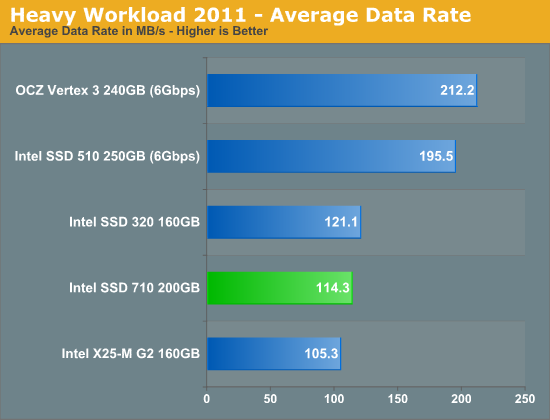
I threw in our standard desktop tests just to hammer home the point that the 710 simply shouldn't be used for client computing. Not only is MLC-HET overkill for client workloads, but the Intel SSD 320's firmware is better optimized for client computing.
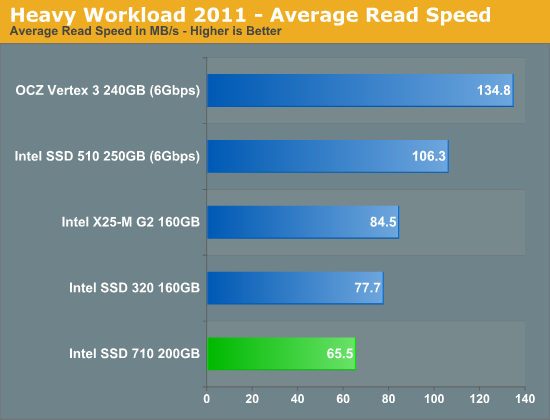
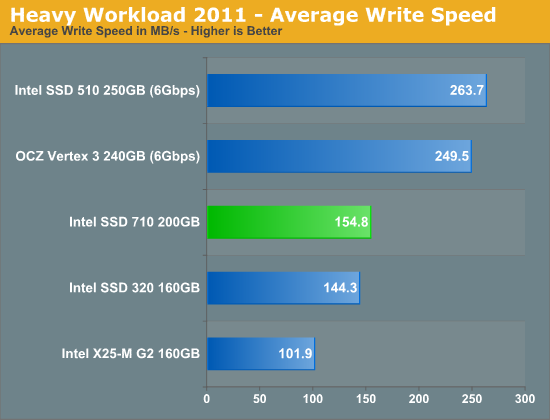
The next three charts just represent the same data, but in a different manner. Instead of looking at average data rate, we're looking at how long the disk was busy for during this entire test. Note that disk busy time excludes any and all idles, this is just how long the SSD was busy doing something:
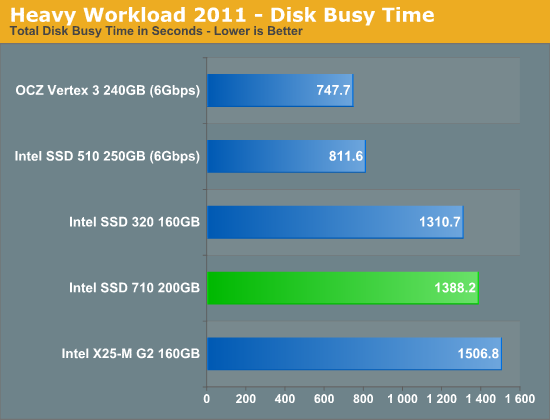
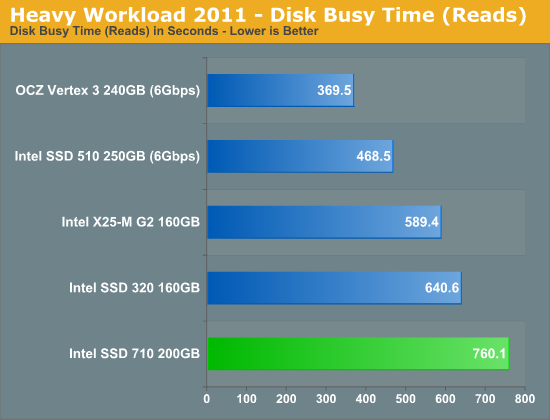
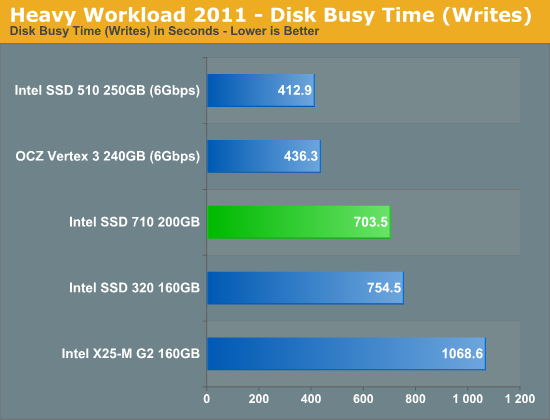










68 Comments
View All Comments
inplainview - Saturday, October 1, 2011 - link
Useless toys? Is this coming from someone that can't afford Apple's offerings or someone who hasn't figured out that Apple is in the mainstream of consumer offerings and mentioning them is this consumer space is quite appropriate considering Apple's influence. You have proven yourself to be myopic and petty.Stas - Sunday, October 2, 2011 - link
umadbro? Everything Apple sucks :Dgevorg - Saturday, October 1, 2011 - link
At least there is no Top 100 iPhone apps here. :)web2dot0 - Friday, September 30, 2011 - link
Unfortunately, that's what people want to read nowdays. Anand is just targeting the mainstream. Otherwise, how will he get all the pageviews? It's a business afterall. Let's not be naive. He doesn't choose his articles to write about by random. There's always a reason to the madness. He's just trying to stay (slightly) ahead of the curve. Too hard out, and it'll become irrelevant.Just wish the team stops writing so many editorial news reporting and focuses more on technical analysis like the ones above. The site is slowly becoming more and more corporate and with time, it will lose it's edge.
Anyways, it's not like other sites are that much better. There's always room for improvement ....
taltamir - Saturday, October 1, 2011 - link
Apple has single digit market-share. This is as far from mainstream as possible.B3an - Saturday, October 1, 2011 - link
....Yeah in computers but thats it. Apple are the largest consumer tech company on the planet, they now make more money than Microsoft. Apple pretty much have a monopoly on MP3 players and online music. They have the single best selling phone, the best selling tablet, and are gaining PC market share. For tech stuff you cant get more mainstream than Apple. There useless devices dont belong on serious sites like this IMO, they belong on dumbed down crap like Engadget.inplainview - Saturday, October 1, 2011 - link
How many of you would be willing to financially support this site so that you can get your truckload of geek? Most likely zero to none. This site is supported via page hits which means that the authors have to write about stuff that most of the basement dwellers here aren't interested in. However, as someone who actually goes out into the sun, knows what women look like, smell like, taste like (figure it out), and realize that there is a world outside of sitting in front of a keyboard and bitching about how this site is not this and that, I can appreciate the work put in. Some of you people are simply whiners and pathetic.Stas - Sunday, October 2, 2011 - link
Apple unofficially owns EngadgetKPOM - Saturday, October 1, 2011 - link
In the US, Apple has the third largest share of the PC market.http://arstechnica.com/apple/news/2011/07/apple-no...
It's lower worldwide, but Apple is definitely a mainstream PC manufacturer.
http://osxdaily.com/2011/03/18/mac-market-share-ar...
Penti - Saturday, October 1, 2011 - link
Anandtech is far from and far more then just a gadget site. Times change and you have to keep up with that to. So of course the focus changes, it's not all about the baddest mainstream overclocking mainboards and high-end gamer gpus any more, things have changed and people come here because it's not just fluff but also digs through down in the hardware/product. You will have more smartphones, notebooks and so on the gpu wars itself won't get you a lot of readers. You will have more enterprise topics and so on. Computing has changed. It's not really about gaming any more and that market has changed.